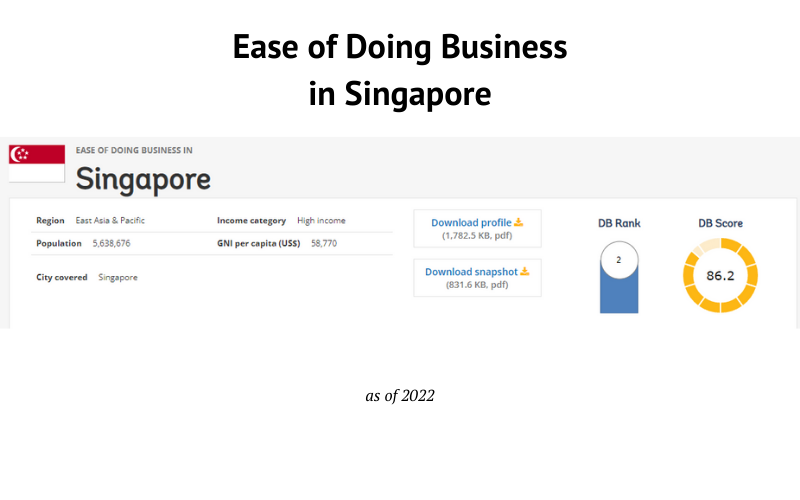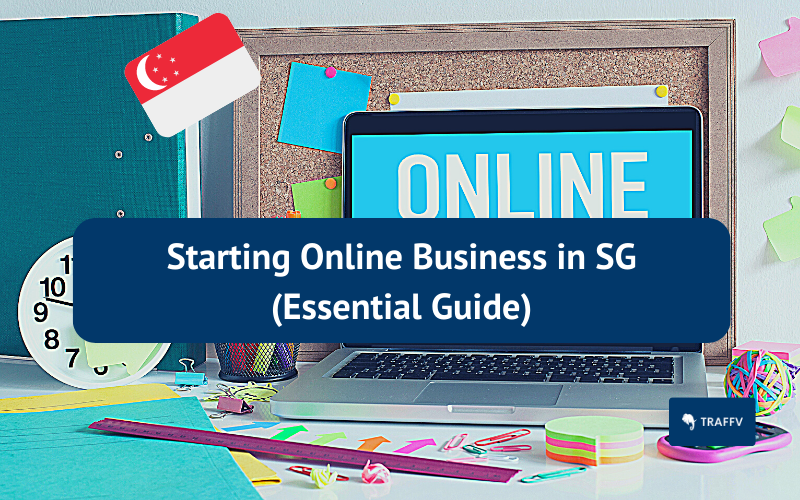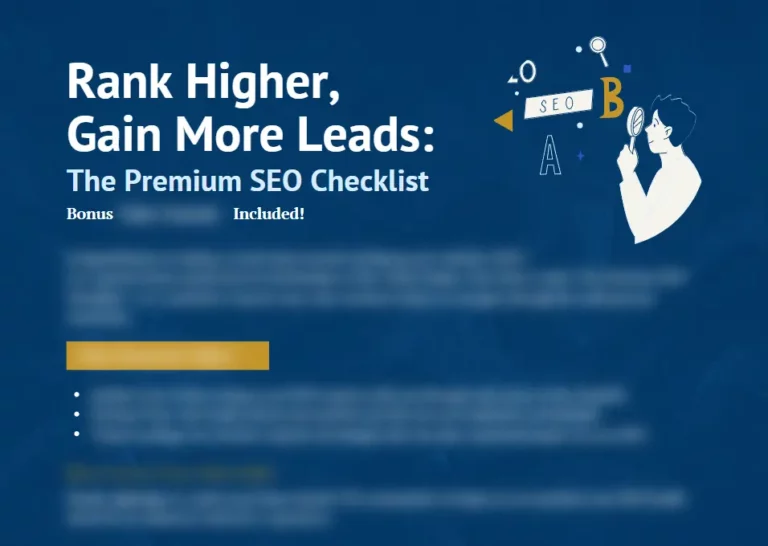The high costs of living and starting a business in Singapore can be a massive deterrent for entrepreneurs.
You must manage business finances like infrastructure costs, employees’ salaries, and other overheads before making a profit.
That’s why the appeal of starting an online venture is so enticing.
Not only do you cut down on physical costs, but you can also reach a global market with just a click of a button.
Looking to build your online empire but don’t know where to start?
We’ve got you covered with this step-by-step guide to starting an online business in Singapore.
Can you Start an Online Business in Singapore?
Yes, you can!
Singapore is one of the most business-friendly countries in the world and has consistently ranked high as one of the most accessible places to start a business by the World Bank.
The 2021 report places Singapore as the fourth-highest out of 190 countries worldwide.

A few reasons Singapore attracts startups include low corporate taxes, easy access to capital, and a robust infrastructure.
The government offers numerous programs and initiatives such as accelerators and incubators to support businesses, especially small and medium enterprises (SMEs).
You can also find a detailed guide on SME marketing here.
Singapore’s Regulations and Requirements for Online Businesses
Before setting up your e-commerce sites and social media accounts, you must know the legalities of starting a new online business in Singapore.
According to the law, all Singapore companies– offline or online – must obtain a valid business license from the Accounting and Corporate Regulatory Authority (ACRA).
Here are the basic requirements for online business registration:
- A local registered business address, not a PO Box number
- At least one shareholder, whether an individual or company
- At least one local resident director
- At least one company secretary
- Paid-up capital of at least S$1
- Statement of business activities
- Personal details of each company member
- A company constitution
- A unique trade name or name that is not similar to any existing company names or trademarks
How to Start an Online Business in Singapore
Getting your online business off the ground involves more than just incorporating it with ACRA.
You need a clear idea of what your web-based business offers, build a website or online shop, and create content that will drive traffic to your site.
Here is a more detailed guide on the steps to take.
Step 1: Decide on your business idea and model.
The first step is to come up with a viable business idea.
It can be something you’re passionate about or an opportunity you’ve identified in the market.
If you’re unsure how to start, consider going through these critical aspects to plan your business strategy properly.
Define Your Product or Service
The most important question that needs to be answered is: what are you selling?
Whether it’s a physical product, digital content, or a service, you want to be clear about what you will offer.
For example, if you’re selling clothes, consider the type of clothing, style, and price range.
Knowing what product or service you’ll be offering is essential to mapping out the rest of your business journey.
Identify Your Target Customers
Once you have your product or service figured out, the next step is to identify who you’re selling it to.
You may think everyone is your target market, but that’s not the case.
Being too general will make creating a targeted marketing strategy and content difficult. So take some time to think about who your ideal customer is.
You can further segment your target audience by identifying their needs, pain points, and aspirations.
This way, you can create content that resonates with them and eventually convert them into buyers.
Choose Your Business Model
Now it’s time to start thinking about how you will run your operations.
Online companies can come in different forms, and here are the most common models to consider:
1. Business-to-consumer (B2C):
This e-commerce business sells products or services directly to consumers.
An example would be an online retail store like ASOS or Zalora.
2. Business-to-business (B2B):
In B2B e-commerce, businesses sell products or services to other companies.
A good example is Alibaba, which connects Chinese manufacturers with international buyers.
3. Wholesaling:
Wholesalers are businesses that sell products in bulk to other companies, who then sell them to consumers.
In many cases, the wholesaler and retailer are the same.
4. Dropshipping:
Dropshippers are businesses that don’t carry any inventory but instead source products from suppliers who ship directly to the customer.
Oberlo is a popular dropshipping platform that connects retailers with suppliers.
5. Subscription-based:
In this model, businesses charge customers regularly, usually monthly or yearly, in exchange for access to a service or product.
Netflix and Spotify are examples of subscription-based online companies.
Research Competitors
Before moving on to the next step, there is value in performing market research.
It will give you a better understanding of the business landscape and what it would take to be successful in your industry.
Once you have gathered information on potential competitors, you can perform a SWOT (strengths, weaknesses, opportunities, and threats) analysis on your business idea.
It’s an exercise to help you position your business in the market and identify opportunities.
Step 2: Incorporate your business.
After giving shape and form to your online business idea, the next stage is registering it with ACRA.
While we already laid out the essential requirements for business registration in Singapore, take time to do your own research.
Here’s some research you should do during the incorporation phase:
Research the Legalities
Check if your business idea is viable and legal in Singapore.
There are several restrictions on what online businesses can be set up in the country.
For example, you cannot start an online gambling business as these are illegal in Singapore.
If you plan on starting a cryptocurrency business, check if there are any regulations you must adhere to.
Before visiting ACRA, also learn what business structure you should choose for your company.
The three most popular structures for small businesses in Singapore are:
| Business Type | Description |
| Sole proprietorship | 1. Simplest and most common structure chosen by entrepreneurs 2. One person owns and runs the entire business 3. You are personally liable for all debts and obligations incurred by the business |
| Partnership | 1. Two or more people come together to start a business 2. Each partner shares in the profits and losses of the business, as well as has equal rights and responsibilities in running the company |
| Private limited company | 1. A separate legal entity from its owners 2. More complex to set up 3. Offers its shareholders limited liability, meaning that they are not personally liable for the company’s debts |
Having a clear understanding of the legalities involved in setting up and running your business will save you many headaches.
Prepare Requirements
Gathering paperwork isn’t the most exciting way to start your online business journey, but it is critical.
Make sure you have all the necessary documents before heading over to ACRA.
The last thing you want is to be told that you’re missing a document and must come back another day.
You can apply for a business license online through ACRA’s e-services portal, Bizfile+.
The application process is straightforward as long as you have all the required documents and information. As stated earlier, you must provide personal and business information and your company’s proposed activities.
When the process is done, ACRA will provide you with a certificate of incorporation, which you need to keep for future reference.
You will also be given a Business Profile containing your company’s Unique Entity Number (UEN). This is important as it will be used for all government-related transactions going forward.
Step 3: Establish your platform and infrastructure.
Now that you have fixed the legal entity status of your online business, it’s time to build the infrastructure to support it.
This includes everything from the platform you’ll use to power your website or online store to the domain name and hosting services you’ll need to keep it up and running.
This step also covers plans on how you will market your small business and promote it online.
Decide on a Platform
You have two options when it comes to setting up your website or online shop:
- use an off-the-shelf eCommerce solution (e.g. Shopify, BigCommerce)
- a content management system (CMS) with eCommerce capabilities (e.g. WordPress with WooCommerce)
The former is a turnkey solution that requires little to no technical expertise;
the latter gives you more control over the design and development of your site but will require some coding knowledge or at least the help of a developer.
The ideal platform depends on your budget and features that suit your business needs.
Before deciding, look up the different eCommerce platforms and compare the pricing, features, ease of use, and reviews.
Register Your Domain Name
Your domain name is your online identity; it’s how people will find you on the web.
When choosing a domain name, keep it short, easy to spell, and relevant to your business.
Once you have a list of potential names, check their availability using a domain name search tool.
After you’ve decided on a domain name, the next step is to find a hosting service.
This is where your website “lives” and needs to be accessible at all times; think of it as the foundation for your online business.
When choosing a hosting provider, consider reliability, speed, customer support, pricing, and security factors.
Build Your Shop
The look and feel of your website or online shop will significantly impact the overall user experience, affecting conversions.
Make sure that the design is visually appealing and easy to navigate.
Your homepage should give visitors a clear idea of your business and what you’re selling.
The product pages need to include high-quality product photos (with the option to zoom), well-written descriptions, customer reviews, and pricing that’s easy to understand.
The checkout process should be as streamlined as possible, and you should have a few different payment options available.
Invest in Advertising
Online advertising plays a huge role in bringing traffic to your website or online store.
Not only does it put your brand in front of people who are already interested in what you’re selling, but it also allows you to target a specific audience with laser precision.
There are many ways to advertise online, and the most common and effective methods are through Search Engine Optimization and Google Ads.
Social media ads are also great for reaching out to potential customers on platforms like Facebook, Instagram, and LinkedIn because of Singapore’s social media usage.
To get started, you’ll need to create an online advertising account with the platform of your choice and set up your ad campaign.
You can do this yourself or hire an agency to manage your campaigns.
Create Content
As an eCommerce business, the quality of your product photos and descriptions is important, but they’re not the only thing potential customers will base their purchase decisions on.
To build trust and establish your brand, you must create high-quality content that educates, informs, and inspires people to buy from you.
This will help build a loyal buyer base, improve your presence on search engines, and lead to a successful online business.
Some of the most effective methods include
- starting a blog
- publishing informative articles on your website
- creating videos that showcase your products in action
You can also create social media posts that promote your content and drive traffic to your site.
Different Types of Online Businesses
ECommerce
An eCommerce store is a platform where you can sell physical or digital products.
If you’re planning on selling physical goods, you’ll need to set up a system for shipping and delivery.
For digital products, you’ll need to find a way to deliver the files to your customers securely.
Online Services
Starting an online business is a great way to get started if you have a service that can be delivered online.
This could include services such as consulting, web design, or even coaching.
Payment models for online services can vary, but they are typically done on a per-project basis or with a subscription model.
Online Marketing
With the rise of social media and digital marketing, many businesses seek help with their online presence.
If you have experience in this area, starting an online marketing business can be a great way to earn income.
Services can include SEO, PPC, or even social media management.
Summary
And that’s it!
You’re ready to tackle the online world and begin reaping the rewards of being your own boss.
But remember, this is just the beginning—the real work starts now.
So don’t stop here; start growing your business and learn how to do marketing in Singapore.




